. . . ’Cause every hand’s a winner
And every hand’s a loser
And the best that you can hope for is to die
in your sleep
–“The Gambler,” written by Don Schlitz
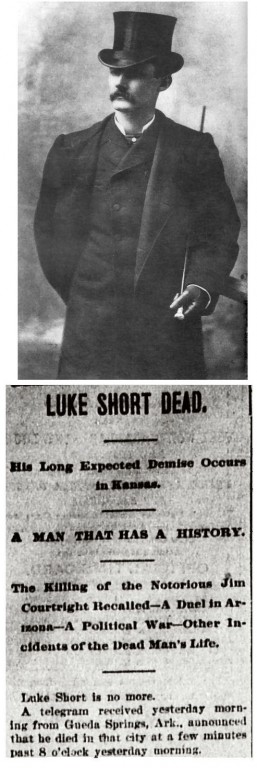 Luke Short died in a way that surely many who were familiar with his past would have bet against: quietly. In 1893 Luke Short died with his boots off, in bed, of natural causes (photo from Wikipedia). No doubt many people who knew Short had figured that when the Grim Reaper called the gunfighting gambler out into the street for the Final Showdown, the Reaper would receive at least a flesh wound.
Luke Short died in a way that surely many who were familiar with his past would have bet against: quietly. In 1893 Luke Short died with his boots off, in bed, of natural causes (photo from Wikipedia). No doubt many people who knew Short had figured that when the Grim Reaper called the gunfighting gambler out into the street for the Final Showdown, the Reaper would receive at least a flesh wound.
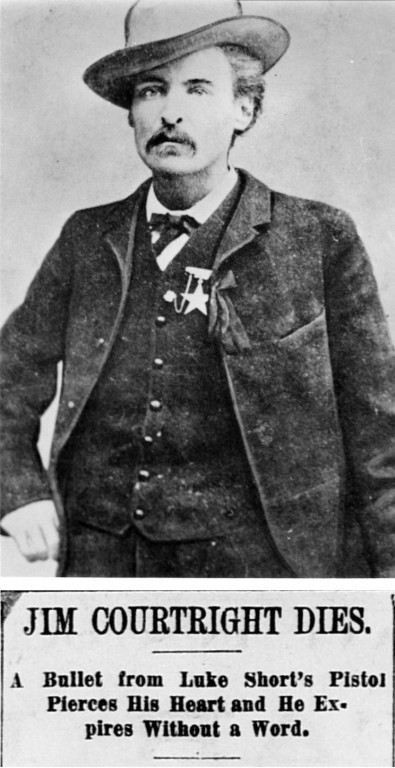 Luke Short spent the last ten years of his life in Fort Worth—a long time in one place for a man of his calling and character. And around here, of course, he is best remembered for killing Jim Courtright in 1887 (photo from Tarrant County College NE). Depending on which account you read, Courtright was the eleventh or the fourteenth man Short had killed.
Luke Short spent the last ten years of his life in Fort Worth—a long time in one place for a man of his calling and character. And around here, of course, he is best remembered for killing Jim Courtright in 1887 (photo from Tarrant County College NE). Depending on which account you read, Courtright was the eleventh or the fourteenth man Short had killed.
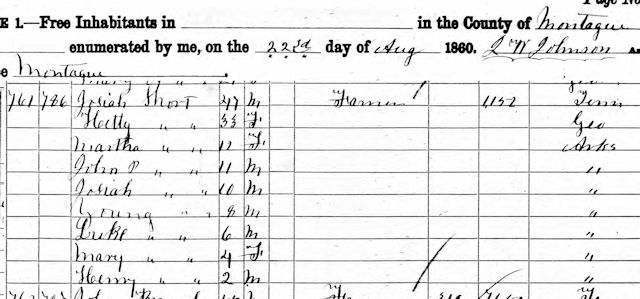 But before settling in Fort Worth Luke Short had led a nomadic life on the western frontier. He was born in Arkansas in 1854 to Josiah and Hetty Short, but the 1860 census lists the family in Montague County, Texas.
But before settling in Fort Worth Luke Short had led a nomadic life on the western frontier. He was born in Arkansas in 1854 to Josiah and Hetty Short, but the 1860 census lists the family in Montague County, Texas.
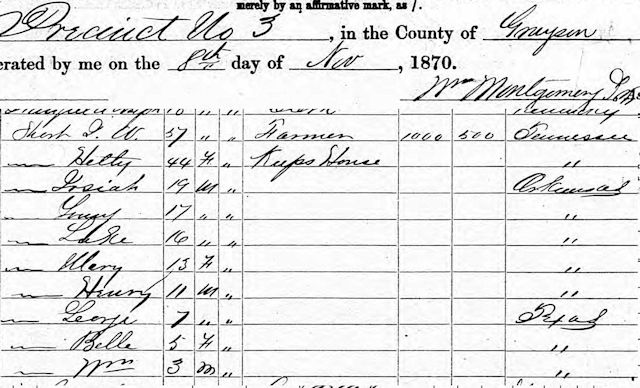 The 1870 census lists Luke, then sixteen, in Grayson County.
The 1870 census lists Luke, then sixteen, in Grayson County.
In Texas Short, according to some sources, learned to ride a horse, throw a lariat, and shoot a gun. He later claimed that when he was fifteen he could hit a quarter from 150 feet away. He worked as a cowboy, a buffalo hunter. As a trader in Nebraska he sold whiskey to Native Americans. In the late 1870s he rode as an Army scout as the government fought Sioux and Cheyenne. The Fort Worth Daily Gazette later described him as “the bravest scout in the government employ.”
But Short soon put down the reins and the rifle and took up the dice and the deck: As a gambler he ricocheted among the boozy, brawling boom towns of the West: Tombstone, Abilene (Kansas), Dodge, Leadville, Yuma, Tucson, Denver.
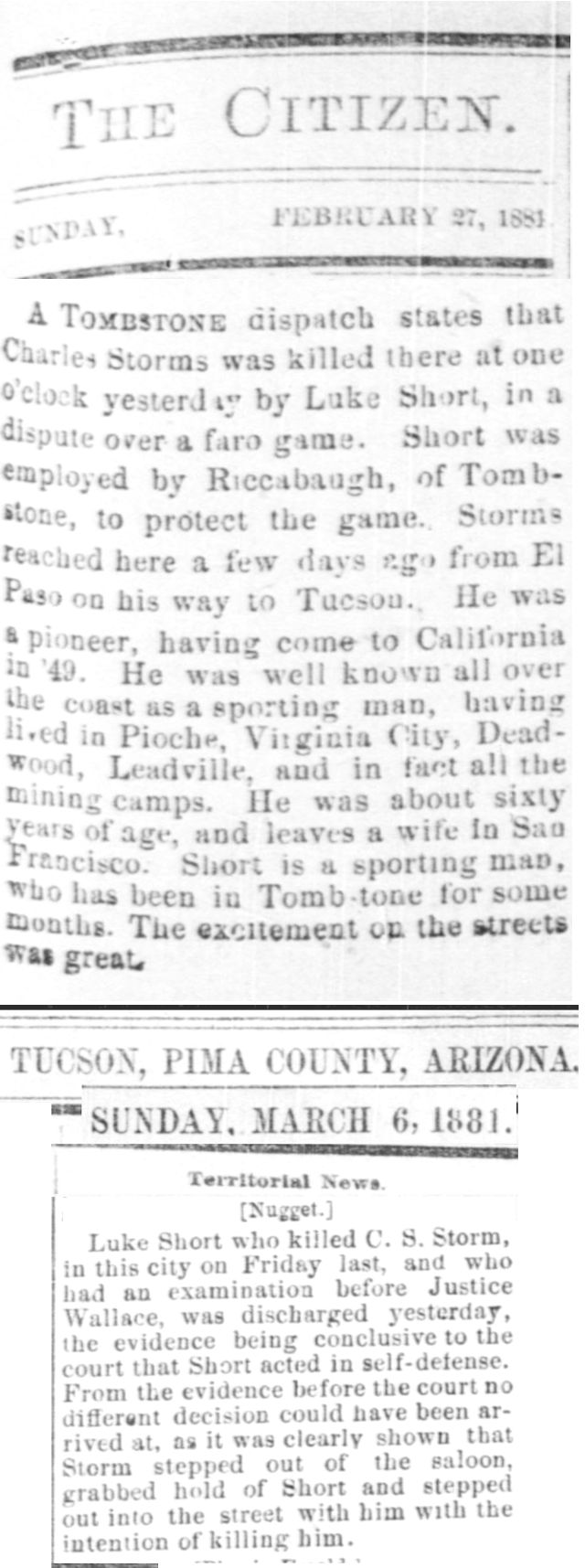 It was in Tombstone that Short killed gambler Charlie Storm in 1881. It was also in Tombstone, according to Short’s obituary in the Dallas Morning News, that Short and gambler Frank Stone “disagreed over something, a woman or a card.” Stone opened fire on Short in the street; Short fired back. Short was wounded; Stone was killed.
It was in Tombstone that Short killed gambler Charlie Storm in 1881. It was also in Tombstone, according to Short’s obituary in the Dallas Morning News, that Short and gambler Frank Stone “disagreed over something, a woman or a card.” Stone opened fire on Short in the street; Short fired back. Short was wounded; Stone was killed.
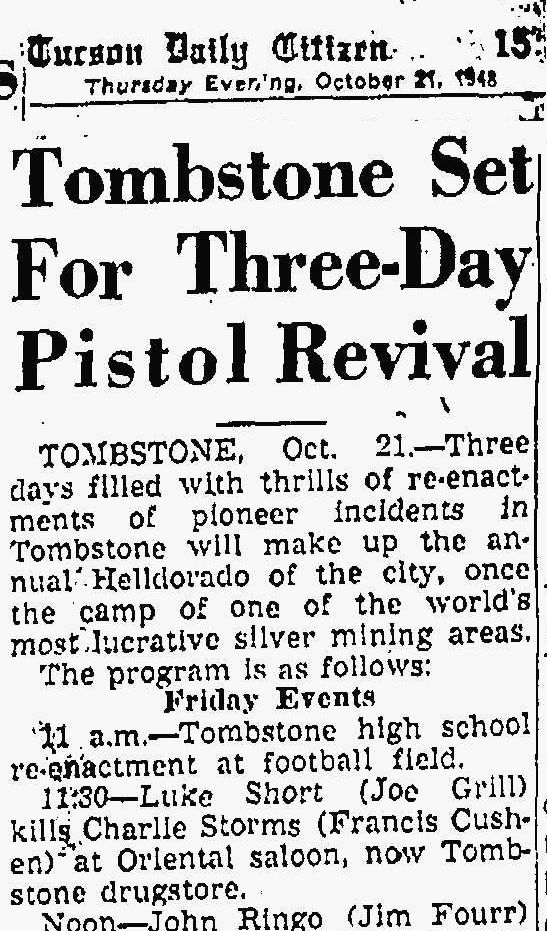 Our modern-day White Elephant Saloon on Exchange Avenue at the stockyards wasn’t the first to re-enact a Luke Short gunfight. In 1948 Tombstone re-enacted the Short-Storm gunfight as part of the city’s Helldorado Days pioneer celebration.
Our modern-day White Elephant Saloon on Exchange Avenue at the stockyards wasn’t the first to re-enact a Luke Short gunfight. In 1948 Tombstone re-enacted the Short-Storm gunfight as part of the city’s Helldorado Days pioneer celebration.
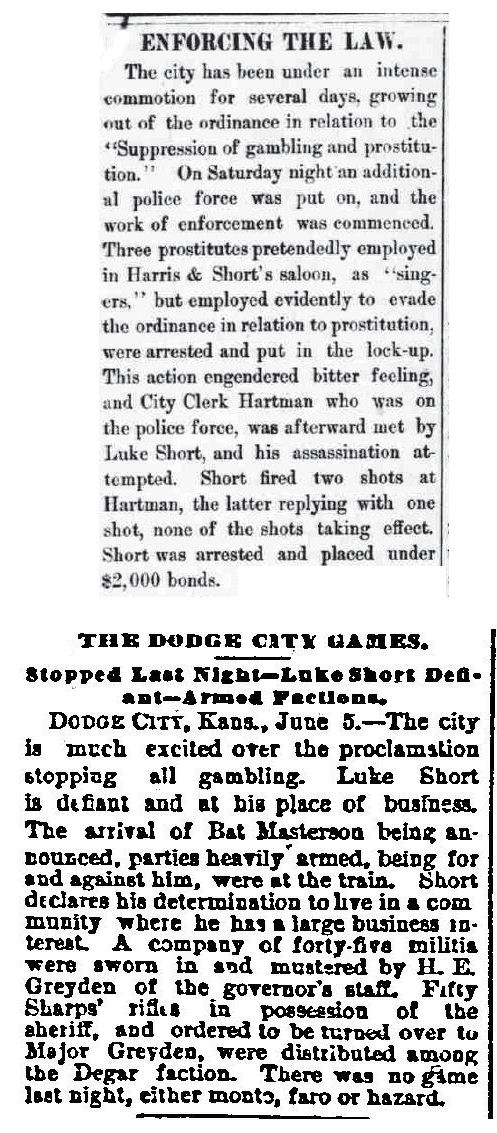 Luke Short dusted himself off, reloaded, and moved on from Tombstone. In 1883 he bought half interest in the Long Branch Saloon in Dodge City. After an anti-vice ordinance was passed, Short claimed that his saloon was unfairly singled out for enforcement. When three female singers at the Long Branch were arrested as prostitutes, Short went to jail briefly. Then Short exchanged gunfire with city policeman Louis Hartman. Short was run out of town as an “undesirable.” But he came back—this time with some of his BFFs: gunfighters Bat Masterson, Wyatt Earp, Doc Holliday, and Charlie Bassett. Faced with this “Dodge City Peace Commission,” Dodge City Mayor Lawrence Deger allowed Short to stay in town upon the promise of no bloodshed. The “Dodge City War” ended with nary a shot being fired.
Luke Short dusted himself off, reloaded, and moved on from Tombstone. In 1883 he bought half interest in the Long Branch Saloon in Dodge City. After an anti-vice ordinance was passed, Short claimed that his saloon was unfairly singled out for enforcement. When three female singers at the Long Branch were arrested as prostitutes, Short went to jail briefly. Then Short exchanged gunfire with city policeman Louis Hartman. Short was run out of town as an “undesirable.” But he came back—this time with some of his BFFs: gunfighters Bat Masterson, Wyatt Earp, Doc Holliday, and Charlie Bassett. Faced with this “Dodge City Peace Commission,” Dodge City Mayor Lawrence Deger allowed Short to stay in town upon the promise of no bloodshed. The “Dodge City War” ended with nary a shot being fired.
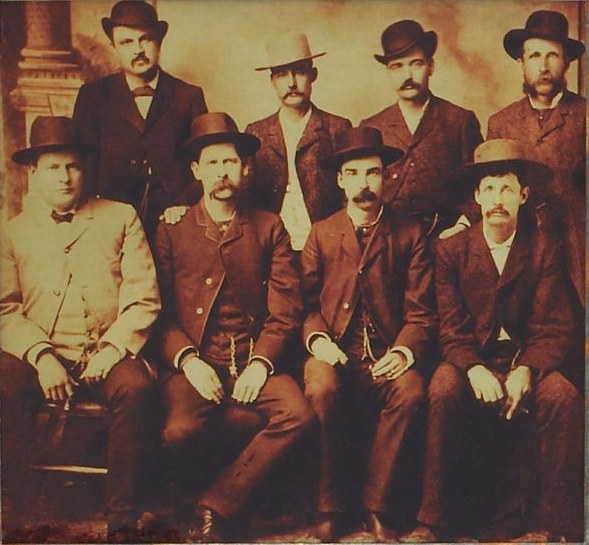 Members of the “Dodge City Peace Commission” posed for a photo in June 1883. From left to right, standing: W. H. Harris, Luke Short, Bat Masterson, W. F. Petillon. Seated: Charlie Bassett, Wyatt Earp, Frank McLain, Neal Brown. (Photo from Wikipedia.)
Members of the “Dodge City Peace Commission” posed for a photo in June 1883. From left to right, standing: W. H. Harris, Luke Short, Bat Masterson, W. F. Petillon. Seated: Charlie Bassett, Wyatt Earp, Frank McLain, Neal Brown. (Photo from Wikipedia.)
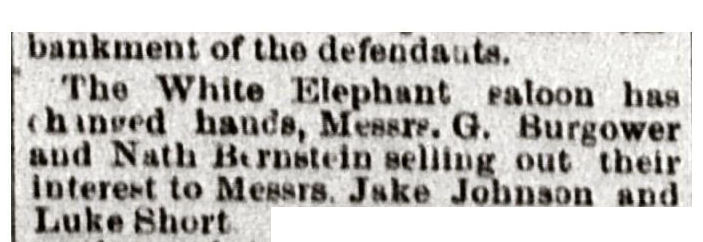 But Short soon got the devil out of Dodge. Late in 1883 he sold his interest in the Long Branch and moved to Fort Worth. In 1884 he, along with Jake Johnson and Alex Reddick, bought the White Elephant Saloon.
But Short soon got the devil out of Dodge. Late in 1883 he sold his interest in the Long Branch and moved to Fort Worth. In 1884 he, along with Jake Johnson and Alex Reddick, bought the White Elephant Saloon.
 The 1885 city directory lists Short as an employee of J. A. Reddick & Co., proprietors of the White Elephant. Short ran the gambling operation upstairs.
The 1885 city directory lists Short as an employee of J. A. Reddick & Co., proprietors of the White Elephant. Short ran the gambling operation upstairs.
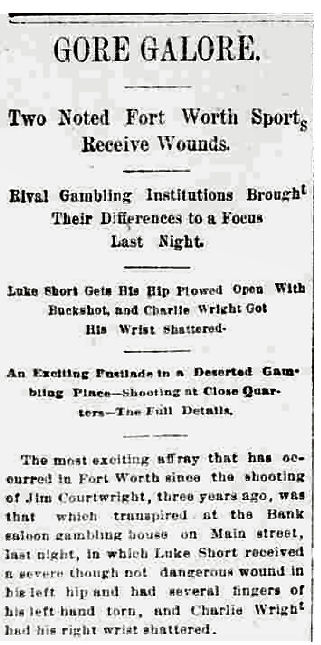 With a couple of exceptions, Short’s ten years in Fort Worth were quiet. The first exception, of course, was the Courtright shooting in 1887. Then, in 1890, two days before Christmas, Short went down into Hell’s Half Acre to confront Charlie Wright, who ran a gambling house, the Bank Saloon, at 1608 Main Street. Short claimed that Wright ran a crooked house. As Short walked down a hall of the saloon, Wright was waiting with a shotgun. Wright fired. Short fired back. Both men were injured. Luke Short had three years left to live. Now he would live them with a crippled left hand and a limp.
With a couple of exceptions, Short’s ten years in Fort Worth were quiet. The first exception, of course, was the Courtright shooting in 1887. Then, in 1890, two days before Christmas, Short went down into Hell’s Half Acre to confront Charlie Wright, who ran a gambling house, the Bank Saloon, at 1608 Main Street. Short claimed that Wright ran a crooked house. As Short walked down a hall of the saloon, Wright was waiting with a shotgun. Wright fired. Short fired back. Both men were injured. Luke Short had three years left to live. Now he would live them with a crippled left hand and a limp.
(Short was tried for aggravated assault and fined $150. His attorney was Robert McCart, namesake of the South Side street. McCart also had been among the men who had put up bond money for Short after the Courtright shooting in 1887.)
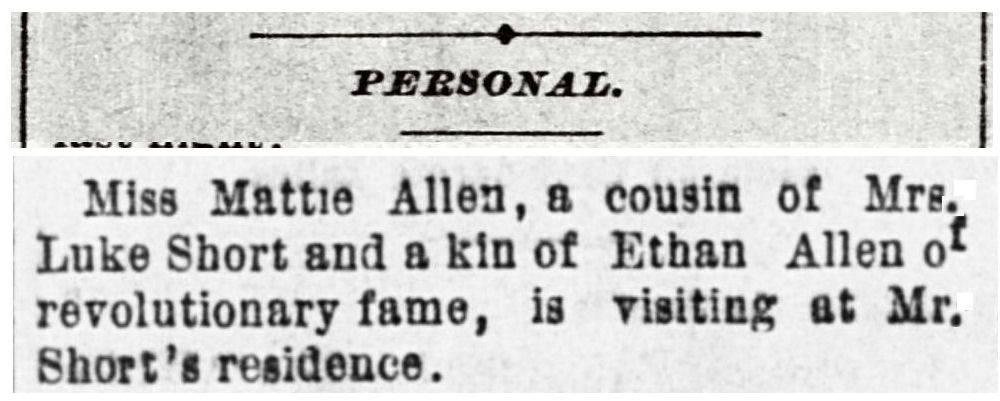 Like most “sports” (gamblers), Short was treated as a respectable citizen in the Gazette.
Like most “sports” (gamblers), Short was treated as a respectable citizen in the Gazette.
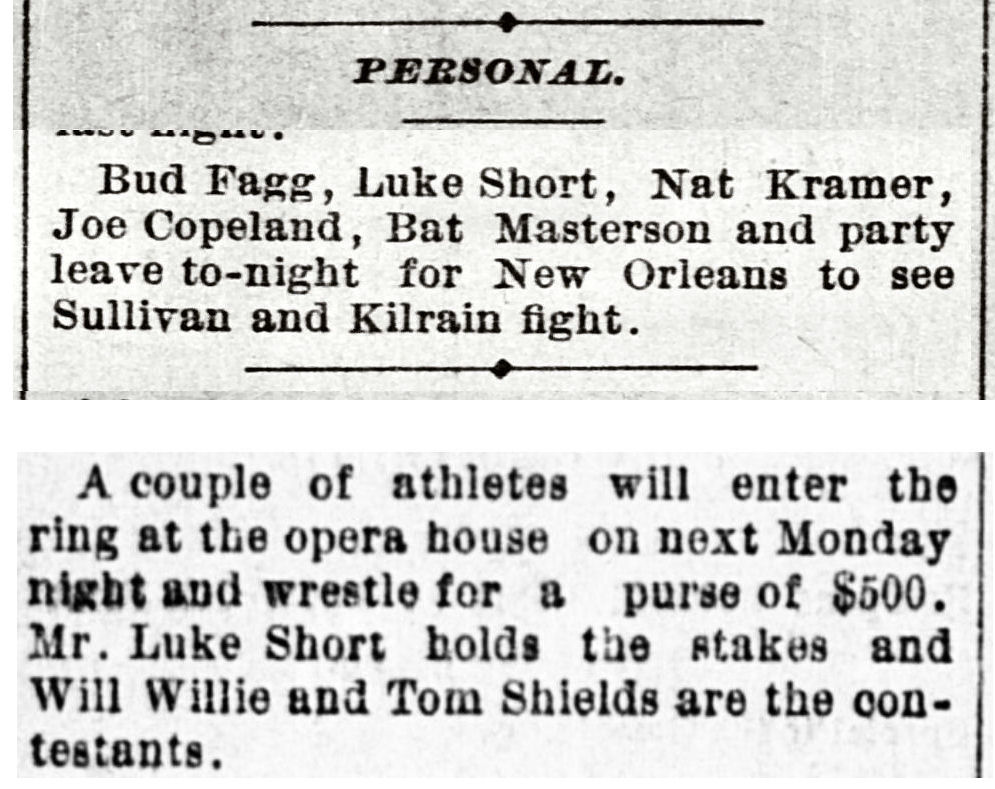 Short made the news most often as a sport. (In the top clip, Short, fellow local gambler Nat Kramer, and Bat Masterson were going to see the John L. Sullivan-Jake Kilrain prize fight—the last bare-knuckle world heavyweight title match. Sullivan knocked out Kilrain, but it took seventy-five rounds.)
Short made the news most often as a sport. (In the top clip, Short, fellow local gambler Nat Kramer, and Bat Masterson were going to see the John L. Sullivan-Jake Kilrain prize fight—the last bare-knuckle world heavyweight title match. Sullivan knocked out Kilrain, but it took seventy-five rounds.)
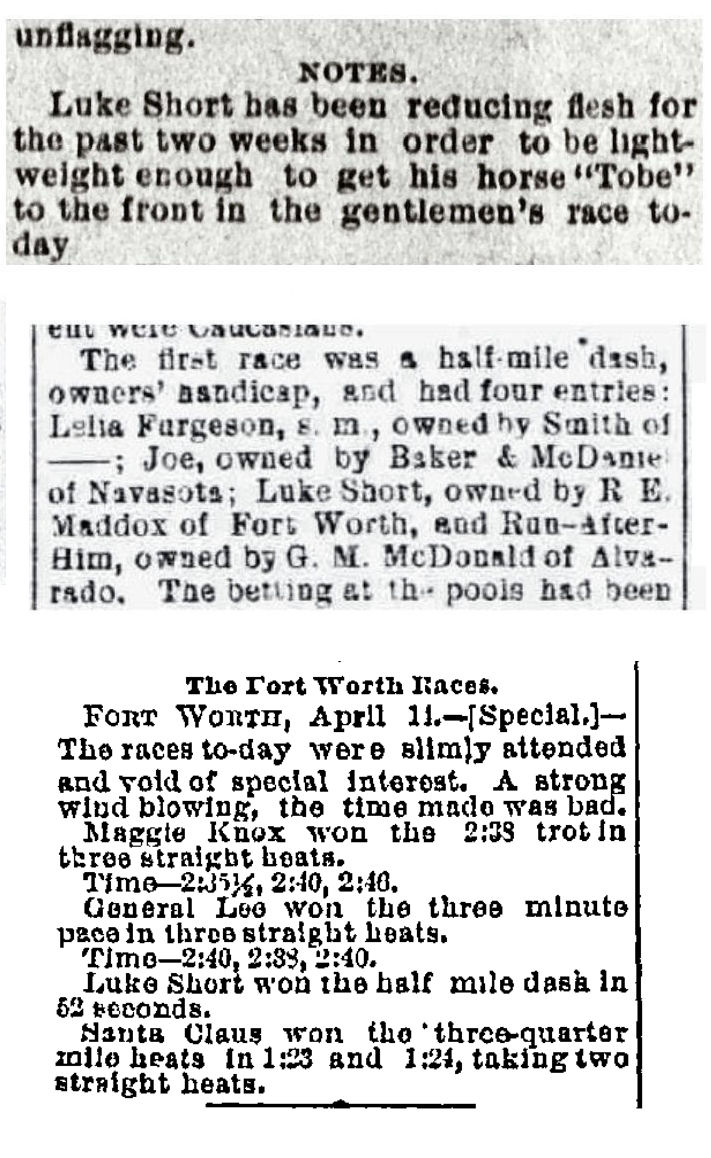 Short gambled not only at gaming tables and prize fights but also at horse races. And not only did Short own—and apparently ride—a racehorse, but also a racehorse was named after him. In the middle clip R. E. Maddox was a prominent real estate developer, city tax assessor-collector, cattleman, breeder of racehorses, and brother of Sheriff Walter Maddox and Police Chief Jim Maddox. In the bottom clip horses included General Lee and Santa Claus. These races probably were held at the Driving Park east of Samuels Avenue.
Short gambled not only at gaming tables and prize fights but also at horse races. And not only did Short own—and apparently ride—a racehorse, but also a racehorse was named after him. In the middle clip R. E. Maddox was a prominent real estate developer, city tax assessor-collector, cattleman, breeder of racehorses, and brother of Sheriff Walter Maddox and Police Chief Jim Maddox. In the bottom clip horses included General Lee and Santa Claus. These races probably were held at the Driving Park east of Samuels Avenue.
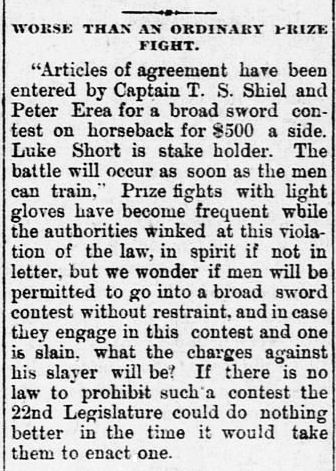 This report in the Brenham Weekly Banner of February 19, 1891 shows that Short was arranging a battle between two men on horseback—armed with broadswords! The “Capt. T. S. Shiel” surely is the local athlete Tom Shields mentioned in the earlier clip.
This report in the Brenham Weekly Banner of February 19, 1891 shows that Short was arranging a battle between two men on horseback—armed with broadswords! The “Capt. T. S. Shiel” surely is the local athlete Tom Shields mentioned in the earlier clip.
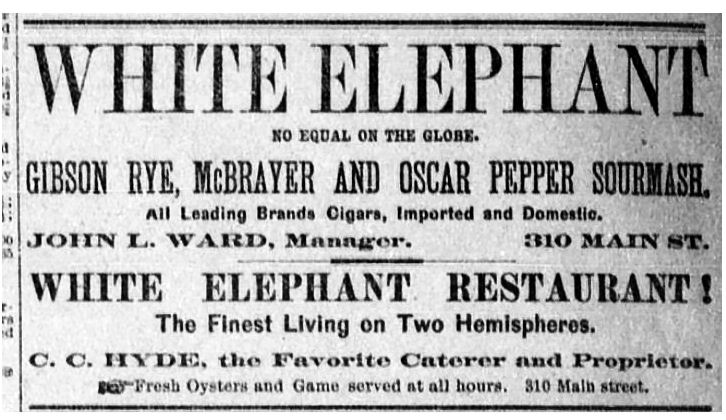 When Short was not at the races or the ring, he was at the White Elephant Saloon or, in later years, at the Palais Royal Saloon a block down the street. The White Elephant was uptown—in every sense of the word. It was a genteel establishment at 308-310 Main, not a rowdy dive down in Hell’s Half Acre, and Luke Short was a sharp-dressed sport, not a Hell’s Half Acre card sharp.
When Short was not at the races or the ring, he was at the White Elephant Saloon or, in later years, at the Palais Royal Saloon a block down the street. The White Elephant was uptown—in every sense of the word. It was a genteel establishment at 308-310 Main, not a rowdy dive down in Hell’s Half Acre, and Luke Short was a sharp-dressed sport, not a Hell’s Half Acre card sharp.
 The 1892 city directory lists Short’s place of business as the “club rooms” (gaming rooms) at 406 Main Street—the Palais Royal Saloon.
The 1892 city directory lists Short’s place of business as the “club rooms” (gaming rooms) at 406 Main Street—the Palais Royal Saloon.
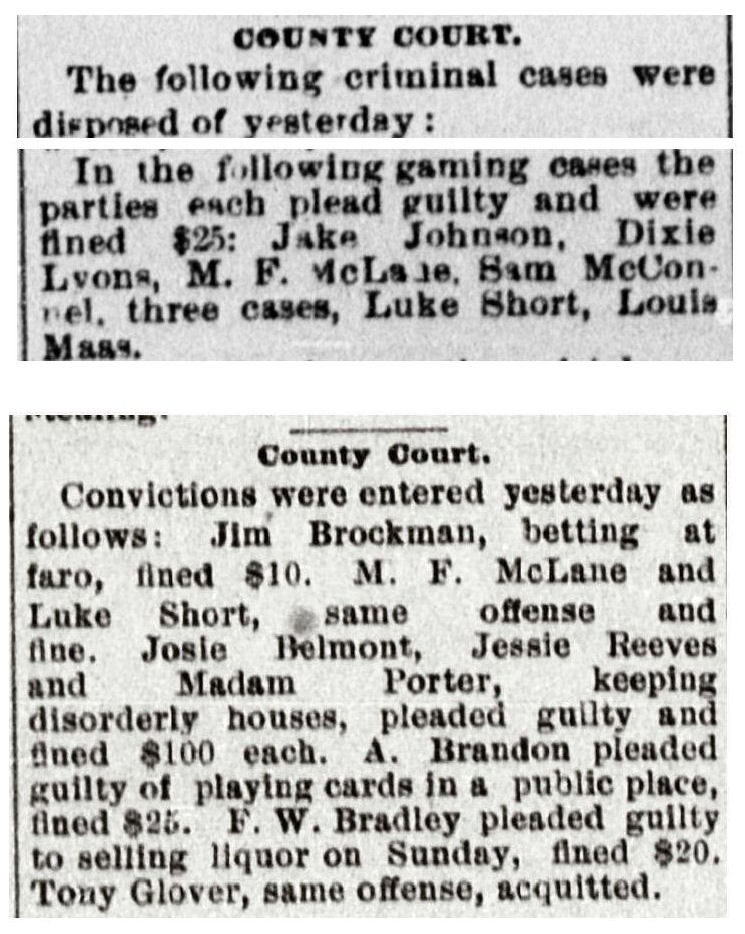 Now and then Short was fined for betting. Only on the police blotter were uptown sports like Short lumped with habitues of Hell’s Half Acre. In the bottom clip Madam (Mary) Porter, Jessie Reeves, and Josie Belmont were Acre madams. Jake Johnson was Short’s partner in the White Elephant and employer at the Palais Royal. And the M. F. McLane in both clips probably is the “Frank McLain” of the aforementioned Dodge City Peace Commission. Gamblers circulated among gambling towns such as Fort Worth.
Now and then Short was fined for betting. Only on the police blotter were uptown sports like Short lumped with habitues of Hell’s Half Acre. In the bottom clip Madam (Mary) Porter, Jessie Reeves, and Josie Belmont were Acre madams. Jake Johnson was Short’s partner in the White Elephant and employer at the Palais Royal. And the M. F. McLane in both clips probably is the “Frank McLain” of the aforementioned Dodge City Peace Commission. Gamblers circulated among gambling towns such as Fort Worth.
Short was known as a charitable man. Bat Masterson in 1907 wrote an account of Short’s life as a “dandy gunfighter” and recalled Short as “one of the best-hearted men who ever lived.” And a prominent Fort Worth minister once said of Short: “I am proud to know Luke Short. Many a widow has been fed and many an orphan clothed in this city through the generosity of this man, who is in the eyes of many an outcast and a stranger.”
But by 1893 the bullet wounds and hard living had begun to catch up with Short. In August he went to Geuda Springs, Kansas, hoping that the curative power of the spring water there would improve his failing health.
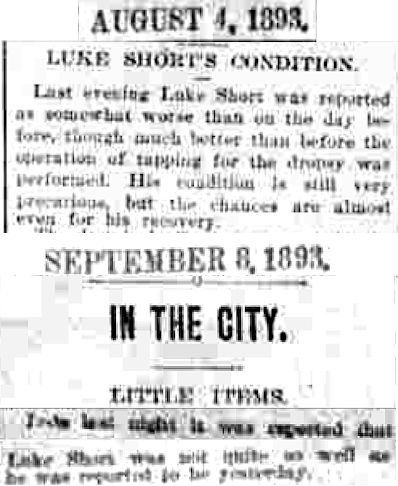 The Fort Worth Gazette published updates on Short’s health.
The Fort Worth Gazette published updates on Short’s health.
The gunfighting gambler Luke Short folded his mortal hand in Geuda Springs on September 8, 1893. The cause of death was listed as “dropsy” (edema, an excess of fluid in the cavities or tissues of the body). He was thirty-nine years old.
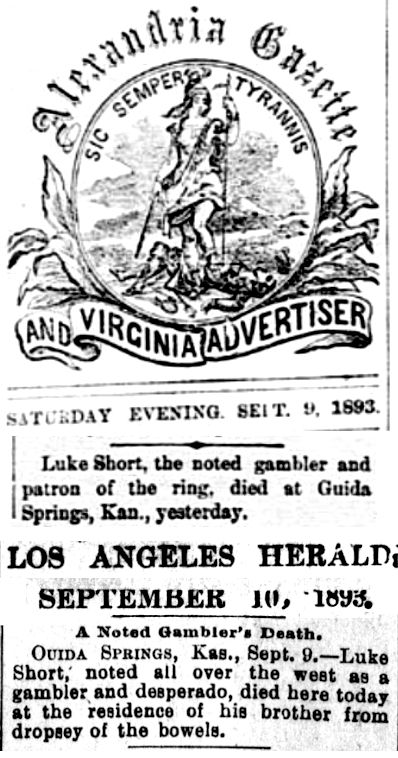
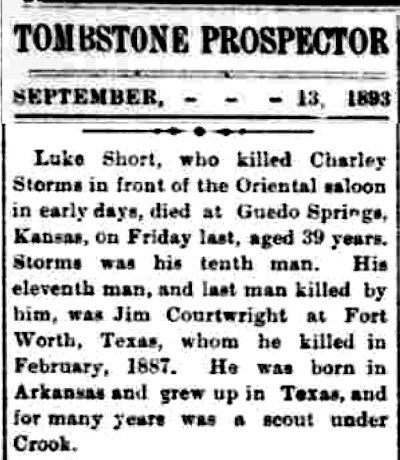 Short’s death was news from coast to coast and, of course, in Tombstone.
Short’s death was news from coast to coast and, of course, in Tombstone.
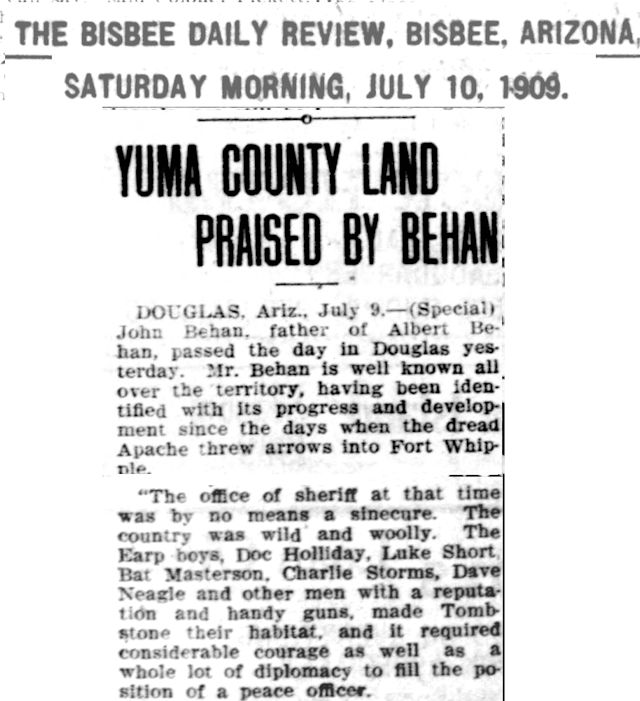
In 1909 former Cochise County Sheriff John Behan remembered Short among the gunslingers in old Tombstone.
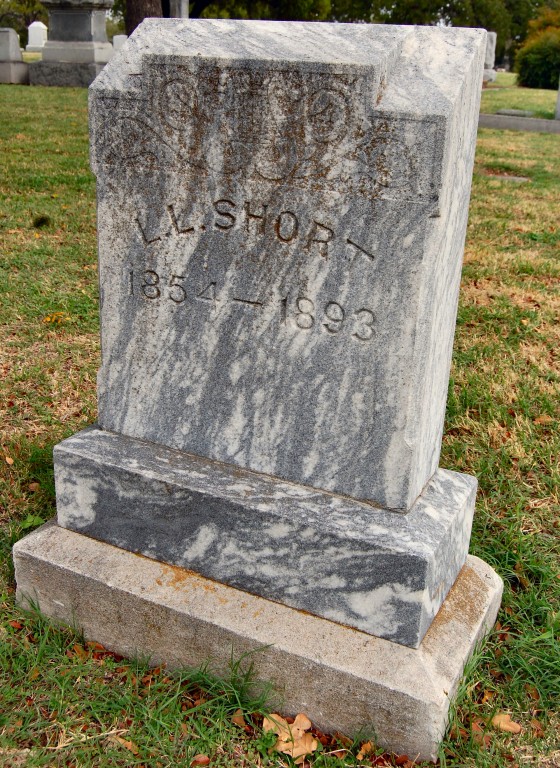
Luke Short is buried in Oakwood Cemetery in section 20. His best-known gunfight victim, Timothy Isaiah Courtright, is buried over in section 27, well out of pistol range.
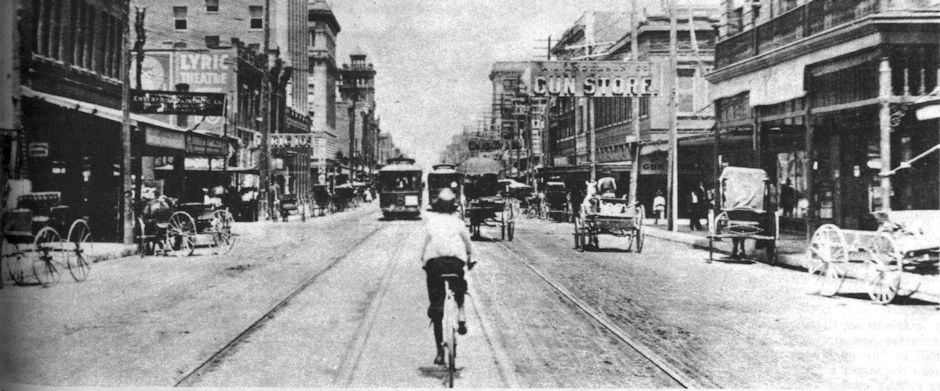





Luke Short had a younger brother, Henry Short. Henry Short was my Granddad’s father, and Luke Short was his uncle. Henry’s son, Walter L. Short is my Granddad. Walt’s son, Wayne, named me Luke, and I named my youngest son Henry after my Granddad’s father.
I grew up hearing the oral history of the Short family from my Granddad. Luke Short, of gun fighting and gambling fame, was named after his mother’s older brother, Luke Brumley.
Hettie Brumley Short’s parents and brothers and sisters all lived in Texas before the War between the States. Her father and two brothers were murdered by bandit Northern sympathizers.
Luke Brumley, though severely wounded, being shot both through the face and the neck during the Civil War, returned to Texas and hunted down the five men that had murdered his father and two of his brothers. He later became the Sheriff of Montague County, Texas, a position he occupied for 38 years.
He received a soldier’s pension from the State of Texas until the day he died for being a veteran of the Confederate Army.
A friend of mine, Daniel Short, of Idaho and currently residing in Bozeman, MT, made me aware of his kinfold relationship to Luke Short and after reading the associated articles shown within this post, I have become quite jealous of Luke Short! I was born in 1954 and I have been telling people throughout my life that I was supposed to have been born in 1854 as was Luke Short. I would’ve loved living his lifestyle albiet taht he died at 39 years of age.
I think he would be amazed by how famous he became and by how long that fame has persisted.
I recently discovered Luke Short is my great great uncle. My great grandfather Charles Ndlson Tice and Short both married Buck sisters.
Luke Short was my Great Grandmas big brother. Her name was Nannie Belle Short. She married Walter Patton, a doctor. This history is so cool. Thank you!
Thank you, Ruby. Luke Short is a big part of Fort Worth lore.
After the gunfight outside of the White Elephant Saloon, Luke short was arrested and placed in jail. Because Courtright was a popular Fort Worth figure, a mob gathered around the jail and there was talk of lynching Short. But Bat Masterson showed up with a loaded shotgun and spent the night in his friend Luke’s cell. That took all enthesiasm for a lynching out of the crowd.
If I read the Gazette correctly, Short was not in jail long. His bail was put up the next day by gambler Jake Johnson, former sheriff Walter T. Maddox, attorney Robert McCart et al.
Thanks for sharing. I love history
Thanks, Helen. Lots more to come.